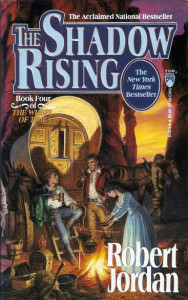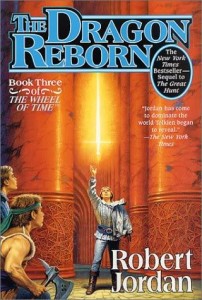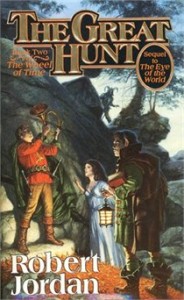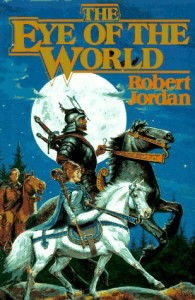Publisher: Tor Books -
Pages: 832 -
Buy: Book/eBook
Editor’s Note: The release of A Memory of Light by Robert Jordan and Brandon Sanderson brings to conclusion the long-running, much-lauded and oft-criticized Wheel of Time series. To mark this event, I’ve invited Larry Nolen, editor of The OF Blog, to republish his reviews of the entire series, one a week for fifteen weeks, on A Dribble of Ink. I consider Nolen to be one of the best online reviewers of Fantasy and Science Fiction, and his reviews of Wheel of Time, in the form of a ’10 Years Later’ re-read leading up to the release of The Gathering Storm, to be some of the most lucid and fair critical analyses of the series available online. You might not always agree with his reviews, but I think you’ll find yourself thinking about the Wheel of Time in ways that might surprise you. So, enjoy. -Aidan Moher
The Wheel of Time turns, and Ages come and pass, leaving memories that become legend. Legend fades to myth, and even myth is long forgotten when the Age that gave it birth comes again. In one Age, called the Third Age by some, an Age yet to come, an Age long past, a wind rose in the Mountains of Mist. The wind was not the beginning. There are neither beginnings nor endings to the turning of the Wheel of Time. But it was a beginning. (p. 1)
For tens of millions of readers, the above passage will be quite familiar. For the past twenty years, Robert Jordan’s Wheel of Time series has been one of the most popular epic fantasy series to be released, with sales of well over forty million copies for the thirteen main volumes, one novel-length prequel, and a related encyclopedia/artbook. It is a series that has legions of devoted fans, tens of thousands of whom have created websites, argued passionately (and some might wonder, pointlessly?) over various minutiae found within this sprawling multi-volume work, and several hundred at least who have named babies after characters or who have had tattoos of emblems found within its pages. However, this series perhaps has drawn one of the largest anti-fan crowds in a subgenre that is littered with negativity and borderline psychotic outbursts directed toward those who do not share in the perpetrator’s hatred for that series (or most any other series). Various forums devoted to discussing epic fantasy series have seen thousands of threads over the years devoted to the question of whether or not Jordan was a “sellout” and to analyzing (sometimes focusing more on ad hominem comments than actual constructive criticism) just where the series jumped the shark and why.
I certainly was no fan of the author’s prose, his characterizations, and my interest in the setting he created dissipated the more I considered the structure behind his constructed mythologies.
I myself began reading the series in November 1997 as a way of relaxing my mind during the brutal written and oral exams for my MA in History. I read the first seven volumes in paperback that year and proceeded to re-read them a few times over the next three years. Read the eighth volume, The Path of Daggers, upon its October 1998 release and I began to wonder what was actually transpiring here. Purchased the ninth volume, Winter’s Heart, upon its November 2000 release and I was so disinterested by the time that I read it that I never read any of the first volumes since then and have read the latest three volumes only fairly recently (2006 for the tenth volume, which was read more so I could write a series of satirical posts rather than because I actually wanted to know what was transpiring there, and 2009 for the last two volumes, since I was receiving a review copy of the latest volume a week before the official review date). While I was not a rabid detractor, I certainly was no fan of the author’s prose, his characterizations, and my interest in the setting he created dissipated the more I considered the structure behind his constructed mythologies. Read More »




